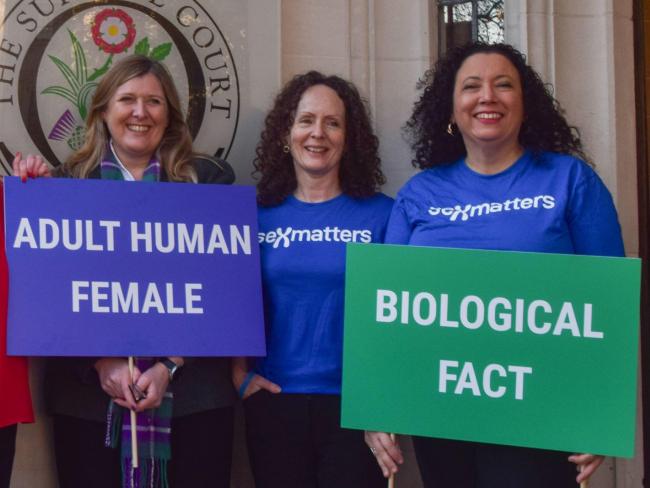24 April 2025

Campaigners from For Women Scotland and Sex Matters at the Supreme Court, London, November 2024, at the start of the hearing on the definition of “woman”. Photo Vuk Valcic / Alamy Stock Photo.
The Supreme Court has ruled that in the 2010 Equality Act, “sex” means biological sex, not “certificated” sex. Their decision, which applies across Britain, was unanimous in favour of For Women Scotland against the Scottish ministers.
Women have lost their jobs or have been disciplined at work for questioning the rationality of overlooking biological sex in the provisions of single-sex facilities and sports. Others have suffered intrusion into what should have been single-sex spaces or unfair and sometimes dangerous sports activity.
Clarity
The ruling will bring clarity and confidence for women and for services like hospitals, hostels, refuges, changing rooms, and sports clubs, even though it’s taken too long to get to this point.
‘Courts don’t operate in a vacuum.’
Courts don’t operate in a vacuum. The Supreme Court only made its ruling because people, the Scottish women and their supporters, had the courage to challenge what was happening in many institutions.
The ruling has implications across the country. As well as government departments and local councils, it will make unions, colleges, hospitals, sports bodies, charities bodies and so on, change their policies. They will have to shift from denial of women’s rights to assertion of those rights, against the unrepresentative, undemocratic, anti-scientific ideas which have prevailed.
Incoherent
The judges said that interpreting sex as certificated rather than biological would “cut across the definitions of man and woman and thus the protected characteristic of sex in an incoherent way”. They ruled that the biological interpretation was also needed for single-sex spaces to “function coherently”.
The SNP-led Scottish administration had argued that the 2004 Gender Recognition Act meant that obtaining a gender recognition certificate amounted to a change of sex “for all purposes”. It persisted in that stance in the face of determined opposition, which they tried to demean and ignore.
Blocked
The SNP wanted to go even further by allowing people to legally self-identify the gender they wished to adopt. That move was blocked by the Conservative government. Not only did a consultation fail to support such self-ID, but the government considered that the law passed by the Scottish parliament would affect equality law across Britain, a view confirmed by the Scottish Courts.
In other words, the powers devolved to Scotland did not run as far as dictating change to the whole country. That conflict played a significant part in the end of Nicola Sturgeon’s role as first minster and SNP leader. True to form, her successor, John Swinney, wanted to continue the policy. His ministers were the main party defending the action in the Supreme Court.
